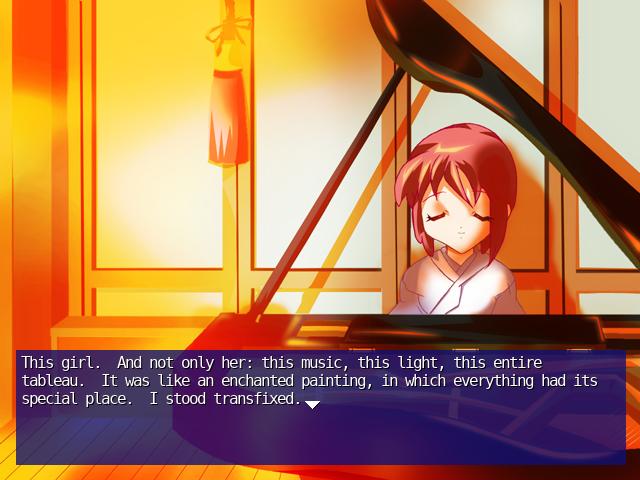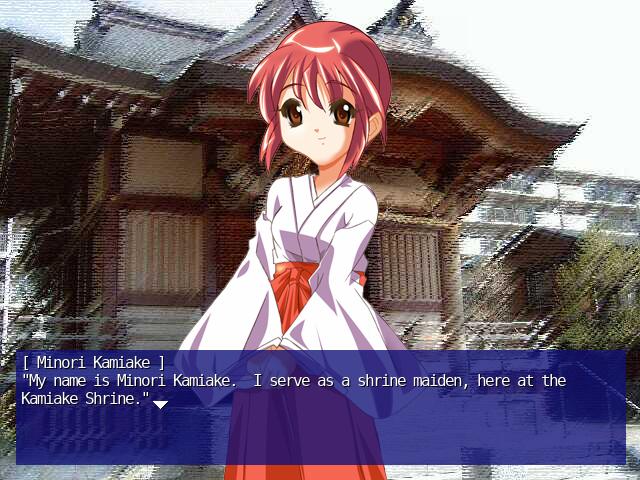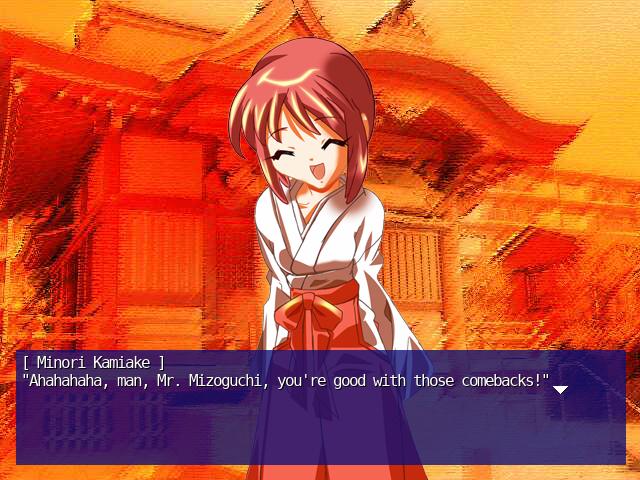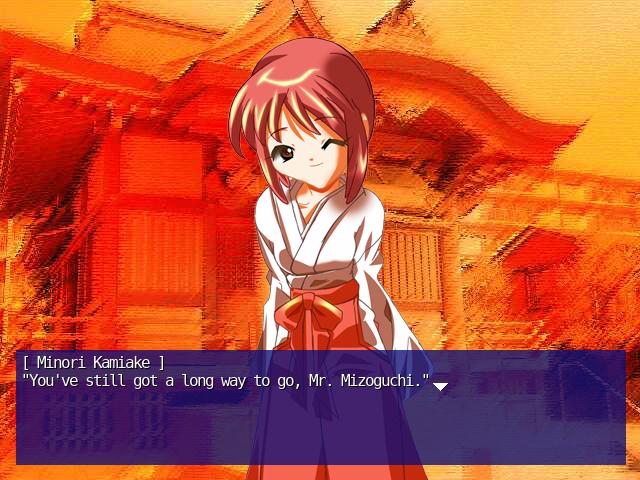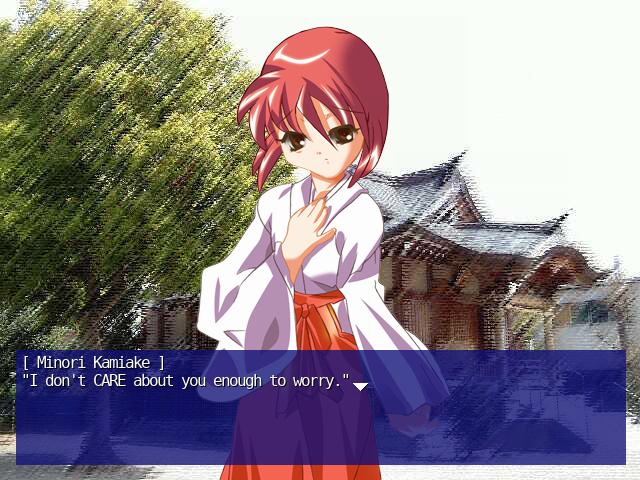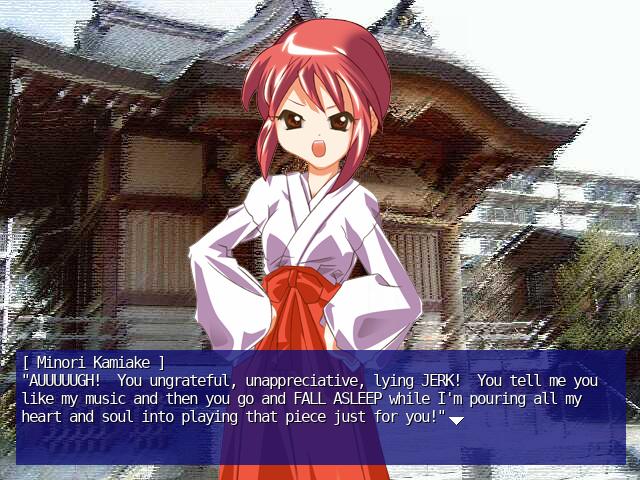Back in 2005, 2006, and 2008, various individuals and groups in the Japanese-to-English game localization community came together to create three visual novel localization festivals, which were called al|together. The three al|together festivals yielded 31 localizations of freeware doujin visual novels from Japan. From April 2021 through December 2023, I wrote full reviews of 29 of the 31 localizations, and in January 2024 I published a final assessment wherein I offered my ranking of all 31 al|together novels, beginning with 31 and working my way to 1. My choice for the best of al|together was May Sky, which was part of the final al|together festival in 2008. However, I have written less about it than some other pieces. We do not yet have a May Sky analysis piece like what I wrote for third-ranked Shooting Star Hill and 14th-ranked From the Bottom of the Heart nor do we have an article about a literary analysis term inspired by the novel like what I wrote for Collage. Today I begin remedying this oversight: Welcome to my story analysis and more in-depth thoughts of the best of the al|together novels (in my book, at least), May Sky.
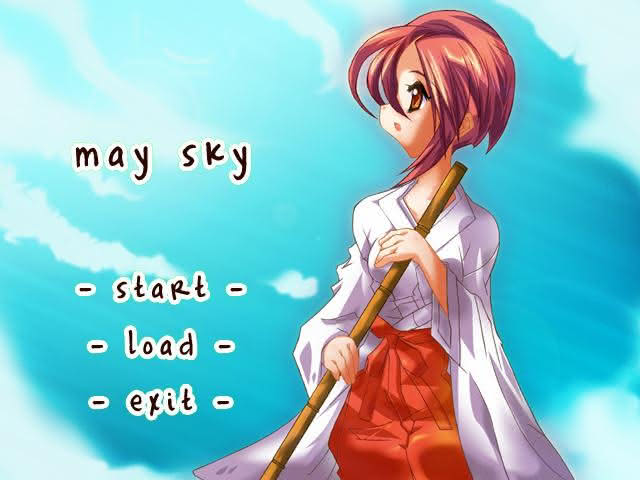
This article is my introduction to what is a four-part May Sky analysis project. The early sections introduce the project and then I get into my analysis, analyzing the in-game period of May 1-8.
May Sky Background Background
If you are not already familiar with May Sky, please take a look at my regular review of the May Sky and, optionally, my article on the first two original Japanese versions of the piece. Here, I will give a very short re-introduction that is intended only to serve as a refresher for people with prior familiarity with the piece or my writing about it.
May Sky is the English localization of a freeware Japanese visual novel called Gogatsu no Sora, developed by circle Scrubbing. Gogatsu no Sora was originally released in four parts in May 2005 as an Adobe Flash game. An installable version with a lengthy extra section was released on August 31, 2005. In 2008, the legendary English language visual novel localization circle, Insani, obtained permission to translate the second installable version of Gogatsu no Sora (the official website for the Japanese novel includes a link to Insani’s page for the English version). Irene Ying localized the novel under the supervision of Seung Park and Insani released it as the final piece of al|together 2008 on December 1, 2008. (May Sky was the last of the 31 al|together novels to be made available for download – a clear case of saving the best for last if you follow my final evaluation.)
You can download May Sky from its official website and run it on Windows or Linux.
Spoiler Notes
While my al|together reviews are largely free of major plot spoilers (with the qualified exception of my first al|together review, The Poor Little Bird), this is an analysis piece, meaning that I am discussing the plot of May Sky. I offer potential readers the following recommendations:
- If you are already familiar with May Sky, I hope you enjoy my analysis.
- If you are not yet familiar with May Sky, have a look at my spoiler-free review of the novel first. If it looks interesting to you, I would encourage you to actually play the novel before reading my spoiler-filled discussion.
- If you have not already played May Sky but plan to do so, you can approach my analysis in one of two ways. Firstly, you can read the novel in full first and then see my analysis. Alternatively, you could follow along with my analysis – which is presented in chronological game order. I include the in-game dates I am covering in each section header for those of you who may want to read my analysis as a companion to the novel.
- If you are 100% certain that you will not be reading May Sky but enjoy The New Leaf Journal and learning about new things, I invite you to read my analysis piece (I would still recommend skimming my original review first). There will be enough detail for you to follow the story.
Without further ado, let us jump right into the first part of my analysis.
Analysis Introduction
May Sky follows the strange developing relationship between its two main characters. The view-point character is always, with one brief exception that we will cover in part three of my analysis, Haruki Mizoguchi, a 22-year old first-year salary man who was sent to a small town for his initial training assignment. In that small town he meets Minori Kamiake, a 16-year old 11th grade high school student who works part time as a shrine maiden at a shrine where her aunt is the head priestess. As we will see in the analysis, that Haruki is the narrator for about 99% of the novel creates an asymmetry. We usually know Haruki’s perspective on things because he is the view-point character. Conversely, we have to rely on Haruki’s interactions with Minori and his subjective impressions of her behavior to understand her thoughts and feelings.
While May Sky has its own internal chapter structure with six chapters in the main story and then an epilogue or extra story called August Snow. I structured my review without much regard for the in-game chapters, focusing instead on where I thought the best break-off points were for each section of my analysis. I ultimately decided to break my review into four articles. In coming up with the structure, I focused on in-game dates (May Sky always specifies a date), but the end of each analysis article coincides with the end of a chapter.
- May 1-8, 2005 (chapters 1-2) < You are here!
- May 14-21, 2005 (chapters 3-4)
- May 24, 2005 – May 31, 2006 (chapters 5-6)
- After May 31, 2006 (August Snow)
I have read May Sky multiple times. For the purpose of this analysis, I converted the novel’s script into a PDF and then annotated the PDF using Zotero.
The bulk of the game takes place in May of a certain year – almost certainly May of 2005 (see my evidence). While May 2005 constitutes the main game, I will argue that this can be thought of as consisting of two halves, with the latter half beginning on May 14 (the novel always notes the day events are happening). After May, there is a comparatively brief section that covers the events occurring between May 31, 2005, and the same day one year later. It is in this section that the novel briefly switches from Haruki’s perspective to Minori’s. Finally, the last part of the novel, which is exclusive to the installable Gogatsu no Sora and May Sky (it is not part of the Japanese-only Adobe Flash version) takes place in what is almost certainly August 2006, 15 months after the events of the main part of the novel.
Before finally advancing to the analysis – note that my analysis is based entirely on the English language localization, May Sky. To the extent there may be some minor differences between May Sky and the original Gogatsu no Sora, I am not competent to consider them.
Note on Quotes
There are no itallics in May Sky. For ensuring clarity, I am using itallics in quoation blocks when the block includes a character’s (always Haruki’s in this analysis piece) internal monologue. I am doing this to distinguish the internal monologue quotes from spoken quotes.
May 1, 2005
May Sky begins with Haruki’s narration on May 1. Before we meet Minori, we learn a few key points about our view-point character. Haruki gives the reader a to-the-point introduction:
My name is Haruki Mizoguchi. I’m 22 years old. I’m fresh meat at a corporation. That’s right, I became a card-punching corporate monkey just this year .. not exactly of my own free will or anything.
Haruki Mizoguchi
He lives in a “nine-by-twelve” apartment that is “[t]he very picture of a ’bachelor pad for a young cubicle rat.” Haruki had been living at his apartment for his new job since April. April is significant because the Japanese school year begins and ends in April, meaning Haruki had completed his final year of college. Haruki is not making a home of his tiny apartment – it is merely a temporary abode for his initial work training assignment.
Haruki insists that he is neither lonely nor depressed. He explains that he had started talking to himself since living alone, but he marked it up to habit. He admits having a lonely feeling looking at the town (just a few lines after insisting he was not lonely). Regardless of whether Haruki is lonely (he certainly is) or depressed (debatable), he is suffering from angst related to taking his first step into adulthood and a new career. In an easy-to-skip line, Haruki describes looking at his unused video game console which he had played constantly as a student (note again he had been a student just two months earlier) but had neglected since starting his job. Something changed in him beyond the simple fact that he finished school and joined the workforce.
Haruki overcomes his malaise to drag himself outside one evening. This proved to be a fateful decision. While on his walk, Haruki hears “the faint sound of a piano, somewhere out there.” It is then our story begins:
I’m pretty sure there was no rhyme or reason to what I did next: I stopped walking, focused on the music, and figured out where it was coming from. Then I started for that general direction. Like I said, the reason was not what you’d call a ‘profound’ one.
Haruki Mizoguchi
Haruki’s narration is interesting in that some points he is clearly reflecting on what happened in the past whereas in others he is offering live commentary on what is happening. The above line is ex post de facto reflection.
[I]t never even crossed my mind that this random little act might have any lasting impact on my life.
Haruki Mizoguchi
But the Haruki who is trying to explain why he did what he did already knows how the story ends. Haruki, likely in hindsight, tries to explain the impulse that drew him to the sound of the piano:
I walked around that sunset road, ears straining to hear and follow the thread of the melody, the way a drowning man grasped at a lifeline he couldn’t even see.
Haruki Mizoguchi
The same Haruki who insists he was neither lonely nor depressed also compares himself then to a “drowning man.” Haruki felt like there was no meaning to anything he was doing and that his decisions were not his own. Looking back, he believes he heard something intangible in those piano notes – something meaningful, or at least that is what he tells himself in hindsight.
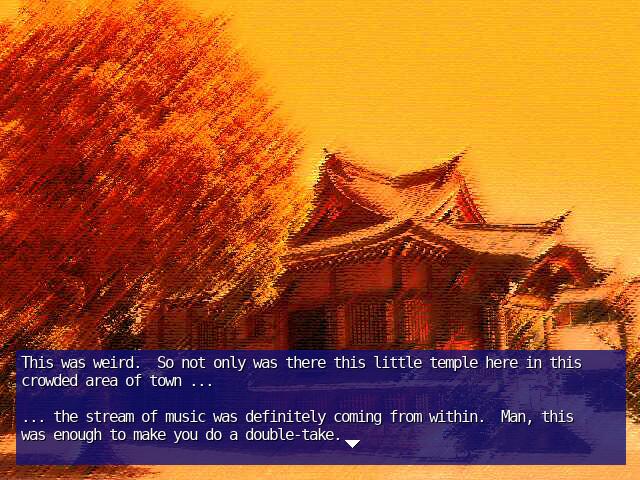
Haruki’s sleuthing brought him to a Shinto temple – not ordinarily a place one would expect to find a grand piano. That someone was playing a grand piano at a Shinto shrine was not the only surprise. Haruki described the pianist:
The high-school-age-ish girl had her eyes closed. Her lips were blurred in a faint smile that seemed to follow along with the movement of her fingers on the keyboard. She was decked out in full-blown shrine maiden regalia, which made it seem all the more bizarre that she was playing a piano.
Haruki Mizoguchi
But another sentiment quickly overrode Haruki’s bemusement:
Beautiful. This was beautiful. I didn’t have another thought in my head. This girl. And not only her: this music, this light, this entire tableau. It was like an enchanted painting, in which everything had its special place. I stood transfixed. For a moment it made me wonder if that lattice door wasn’t the gateway to a whole other dimension.
Haruki Mizoguchi
The “whole other dimension” line proves to be an apt description of the place that will become the center of Haruki’s life that May.
Haruki and the girl whose name Haruki did not yet know had a brief encounter after she finished her performance. Haruki awkwardly told her that the songs were “beautifully played” and the girl shyly thanked him before heading on her way. We return to Haruki in retrospect about that day:
Our little concert. Our brief meeting. No more and no less. I didn’t know at all whether something like that could have any impact on the future. Either her’s or mine.
Skipping ahead a few lines:
Then again … you know how they say that the journey of a thousand kilometers begins with one footstep? It’s funny – important matters always start with something that seems tiny and inconsequential at the time.
Haruki Mizoguchi
May 3, 2005
We then jump from May 1 to May 3. May 3, a Tuesday, fell during Japan’s Golden Week holiday. Haruki found himself unable to take advantage of the holiday:
Starting somewhere around the end of April, there was this leaden weight that sat inside me daily and enervated me and sucked out all my desires, motivations, energy – everything. Nothing got to or into me. I was just barely functional enough to carry on every day.
Haruki Mizoguchi
In one of his more insightful moments – Haruki attributed his deep malaise to “freshman blues,” an April-May phenomenon particular to new students and members of the workforce fresh out of school. Of course, what starts as unease particular to a certain circumstance can grow into something more. Haruki again made his way to the shrine where the girl was again playing the piano. On this occasion, Haruki fell asleep while listening to the girl play the piano. The shrine maiden woke him up by poking him after her performance and asked if he was the same guy who had been there the day before. Haruki confirmed he was. The girl then went on her way.
May 4, 2005
Haruki returned to the shrine on the fourth of May – this time bringing lunch. He discovered that the girl played for more than three hours – something he found remarkable. It was on May 4 that Haruki and the girl, who was startled when she exited the lattice door and found Haruki, had their first somewhat-substantive interaction. Haruki humorously had to convince the girl he was not homeless (based on her having to wake him up the day before). He accounted for his presence:
Well … I came because .. the piano sounded so nice …
Haruki Mizoguchi
The girl was taken aback, insisting she was just a hack. But when Haruki expressed his sincerity – the girl was genuinely happy and started slapping Haruki on the back out of embarrassment – which caused Haruki to note to himself that her behavior was not consistent with her appearance. The girl told Haruki she would play for him more after she finished her work, which turned out to involve five minutes of sweeping the already-clean shrine grounds. After this remarkably quick cleaning session, we finally start to learn about the shrine girl.
The girl introduces herself as Minori Kamiake, a shrine maiden. She states that she is a second-year high school student (senior high school is three years in Japan, so she is an 11th grader in U.S. terms) and had been working at the shrine for four years (see my companion editorial on localizing Japanese high school years). We can reasonably infer that Minori is 16 years old from her grade level and from our much later learning that her birthday is January 12 (note again that the school year in Japan starts in April). The head priestess of the shrine was Minori’s aunt – explaining why the shrine was called the Kamiake Shrine. Minori was impressed when Haruki introduced himself as a company man, despite Haruki insisting he did not feel like a grown-up. Minori then became self-conscious about how much she was talking before admitting she was flustered about having her piano playing praised. Before Minori returns to the piano to play for Haruki, we learn that she is playing songs written by her mother. Minori’s reasons for playing the piano are simple and straightforward: She liked practicing, enjoyed playing, and confessed that she did not have anything better to do. The reason the piano was at the shrine was because Minori had begged her Aunt to take it after her parents moved and the piano did not fit in her new, presumably smaller than before, bedroom.
We begin to see a relationship dynamic develop between Haruki and Minori. First, on several occasions, Minori sets up a joke, says something unexpected, and Haruki responds with astonishment in a straight man role – wherein Minori praises him for his “comebacks.”
Minori insists that Haruki call her by her first name without honorifics, stating that everyone uses honorifics with her and she hates them. This passage struck me as interesting. If one were to read it as her referring to her life in general, it may suggest that she had no close friends at school – or at least close enough to forego honorifics. However, upon reflection, I think in the full context of the line and its place in the overall story, Minori is more likely referring to how people address her when she is working at the shrine. In any event, Minori refers to Haruki respectfully as Mr. Mizoguchi (see Mr. Seuing Park’s note about how the translation deals with Minori’s use of honorifics). Perhaps hedging against familiarity in speech, Minori warned Haruki that she did not “go out with old men” – which Haruki said in a mental note he was not “broken up about it … much.” Minori went on a brief rant about how there was a “shrine maiden fetish” and some people went to the shrine just because of that, calling it “DisGUSting.” While this is not important in and of itself – Minori’s thoughts here are worth filing away for the end of this first analysis piece.
Haruki then convinces Minori to answer whether she formally studied the piano. While Haruki greatly enjoyed Minori’s playing, he takes pains to remind the reader that he knows nothing about music. Minori states that she “used to” formally study and even participated in competitions, but that now she plays “to pass the time.”
No recitals, so no stress – and I can play whatever I like now.
Minori Kamiake
Minori does what she wants to do and does not do what she does not want to do. Haruki was somewhat surprised, stating that Minori played with passion for someone who talks about playing so casually. He then observed Minori’s reaction:
She looked away a little as she responded [with ‘… hmm … maybe …’]. It was a tiny, tiny motion – but one that stayed with me, somewhere, for a long time.
Haruki Mizoguchi
We learn a decent amount about Minori from her initial conversation with Haruki. Moreover, we see what will become a template for their interactions for the majority of the novel.
May 5, 2005
Haruki returned to the shrine the next day with a problem. His mother had sent him a large number of rice cakes with instructions to share the extras with people in his building. However, Haruki had no friends there, just acquaintances, and many of his acquaintances were home for the holiday. He gave away what he could, but still had about 12 cakes. Haruki decided, for the first time, to dump his problem on the shrine maiden (or at least try to).
Haruki was greeted by a mild insult from Minori:
Sup dude? Long time no see … SINCE YESTERDAY. As bored as ever, hmm?
Minori Kamiake
Minori created what we will see becomes a greeting tradition. Haruki described Minori’s attitude to himself as cute – an attitude he would need to keep for our in-game friendship to pan out. Insults aside, Minori was clearly happy to see Haruki again – at least until he revealed the purpose of his visit. It turned out that Minori had already eaten nine rice cakes that day brought by families – as shrine maiden she could not say no. She however felt perfectly comfortable rejecting Haruki’s rice cake. She also felt comfortable landing an upper-cut on Haruki’s chin when he stuffed a rice cake in her mouth.
After the dust settled, Haruki and Minori sat and talked together – she having eaten one of his rice cakes and Haruki taking on five. They sat and talked and a new dynamic developed:
Minori started to gripe her way through everything that happened that day.
Haruki Mizoguchi
Among the many things she griped about that were particular to the holiday and her duties as a shrine maiden, Haruki noted that she complained about being bored when people did not come but she was annoyed when they came when she tried to start playing the piano.
There she was, chattering away as if she wanted to convey every single moment of her waking day to me. And there I was, listening and nodding appropriately.
Haruki Mizoguchi
Here we start to learn a little bit more about Minori. She seems lonely herself – and perhaps as a result took quickly to “chattering away” to Haruki, someone she had only formally introduced herself to one day earlier. Minori did not seem to want anything from Haruki other than for him to sit and listen to her complaining. In musing to himself in the narration, Haruki found it odd that he was “enjoying the time we were spending together.”
Then, suddenly, Minori shifted from complaining to what would be one of the more significant monologues of the story. I will excerpt part of it below, cutting out Haruki’s brief interjections:
May is wonderful, isn’t it? … [I]f you ask me, [it] is the most wonderful month out of the entire year. My dear Mr. Mizoguchi, have you ever looked outside and felt ‘life’ all around you this season? [O]f sprouting grass … of newborn leaves … the stems that grow … the tender breeze .. wisteria .. and peonies .. the sweetest scent of freshest tea … it takes a forest … or a wilderness. Not a village .. I think you’ll know what I’m talking about if you go to a place where nature can seek you out. And when it finds you – the smell of the plants, the song of the trees – you feel ‘life’ like never before. ‘Life’ from within, telling you ‘keep moving forward, no matter what.’ That’s why I love May. I love how this is the season where the entire world makes you stand up and take notice – that it’s alive.
Minori Kamiake
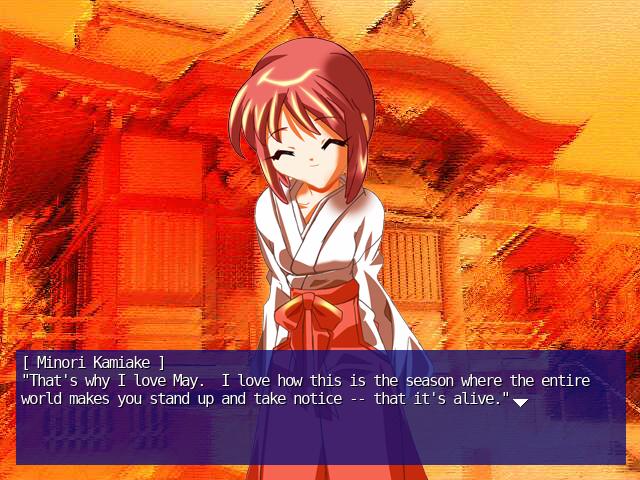
Haruki mostly listened, giving a few short answers to Minori’s questions. He noted to himself that she looked genuinely happy as she talked and that it seemed “as if she were entrusting me with a silent secret…” Having admitted in his narration that he had never thought of May in this way before, Haruki recalled that “for the briefest of moments … I saw .. something incredible in her.” That this is a key moment in the novel should go without saying. Minori’s aesthetic sensibility, specifically her wistful admiration for the simple things around her, touched Haruki, who had already conceded in his narration that he felt dead inside. Minori opened Haruki’s eyes to something new – the world around him. For Minori, she found someone she felt comfortable expressing her aesthetic sensibilities to in an unguarded way – something that, for whatever reason, she may not have been comfortable doing with her peers.
As they parted ways, Haruki asked Minori if he could return to the shrine. Minori told him to do whatever made him happy – which Haruki decided “was just like her.” While Minori objectively conveyed that she did not care one way or another, her words carried inadvertent meaning to someone who, just a couple days earlier, could barely motivate himself to leave his apartment.
We have two final encounters to cover in this section: May 7 and 8. Both of these, especially May 7, are more (or even more) comic than Haruki’s and Minori’s first couple of meetings, but they nevertheless reveal more points about Minori and her understanding of her strange developing friendship with a certain directionless office worker six years her senior.
May 7, 2005
Haruki visited the shrine on the afternoon of May 7 after having, by his own admission, slept for 10 hours (which predictably causes Minori to call him a bum).
That was apparently not enough sleep for Haruki, who fell asleep on the steps of the shrine while Minori was sweeping. Minori woke him up by violently (according to Haruki) wrenching his nose. Minori’s explanation:
I … HAVE A PROBLEM WITH A LAZY BUM WHO JUST LIES DOWN AND SNORES WHILE I FREAKING SLAVE AWAY!
Minori Kamiake
Haruki, perhaps tempting fate, then fell asleep while Minori was playing the piano. He was greeted by a broom to the forehead. Minori’s explanation:
You ungrateful, unappreciative, lying JERK! You tell me you like my music and then you go and FALL ASLEEP while I’m pouring all my heart and soul into playing that piece just for you!
Minori Kamiake
While Minori was violent, it was clear that some of her violence and rage was in good fun or just her way of interacting with one particular individual – for she quickly forgave Haruki who promised that he would not fall asleep again.
A careful reader should pick up that there is something to Minori’s newfound irritation with Haruki sleeping at the shrine, for there was no sign she held his earlier sleeping against him after they were properly acquainted. While Haruki may have been confused – the answer to this conundrum was in their previous interactions. Minori enjoyed “chattering away” at Haruki about the things that annoyed her, her interests, and her most sentimental thoughts about nature. She also appreciated that her piano playing touched someone. Mostly, Minori wanted someone to listen to her and pay attention to her, and she wanted attention without having to beg for it. Her simple desire for him to pay attention to her was fundamentally at tension with his falling asleep in her presence. While Haruki’s many instances of immaturity (many more will be forthcoming) are usually less forgivable than those of a 16-year old girl, Minori unintentionally reminds us that she is a lonely, somewhat needy, very insecure, and often temperamental teenager.
There are some fun exchanges after Minori and Haruki (quickly) reconcile, but I will share just two – an anecdote – which sheds some further light on Minori. Here, Minori gives a long-winded explanation into why she wears shrine maiden robes despite not technically being a shrine maiden in the formal sense. When she first started working at the shrine, old women from the neighborhood would hand her candy as if she was working there as a good deed. In reality, as Minori explained, it was a part-time job her Aunt was paying her for. She discovered that by wearing the robes, people would understand that she was working at the shrine. Present Haruki’s ability (as opposed to narration lines where he is talking with obvious hindsight) to understand Minori is inconsistent throughout the story, but here he showed a moment of clear insight:
Interesting. So she hated being seen (misrepresented?) as this nice girl who volunteered for these things out of the kindness of her heart.
Haruki Mizoguchi
We have clear evidence that Minori is short on close friends – both from some of her exchanges with Haruki and the fact that she is spending her entire Golden Week break working alone at the shrine (not to mention nattering away at a 22-year old office worker she has deemed to be a bum). Now we learn she does not like it when people misunderstand her or why she does things. Assuming arguendo Minori does not have someone in her life to complain to about annoying things at the shrine, or to share her feelings about nature with, or to listen to her piano playing – what face does she show to others and how does she feel about how others see her?
May Sky is an almost entirely non-interactive visual novel which. However, there are two ultimately meaningless choices which result on minor dialogue differences on May 7. The second and more notable gives Haruki the opportunity to respond in one of two ways to Minori saying that she likes her shrine maiden robes despite them being “kinda strange in this day and age.” If Haruki simply agrees with Minori, she launches into a humorous monologue about wielding a naginata, which results in a symbolic exchange of mildly violent gestures between the pair. While the naginata dialogue is amusing, we will focus on the second choice – “I think they’re cute, actually” – because it results in a more interesting (for our analysis, at least) response from Minori. There, Haruki tries to convey nicely that he thinks Minori’s shrine maiden robes are cute. Minori took it as Haruki thinking that she was cute and appeared happy, although she threatened him with further violence (snapping every bone in his body) if he meant that she looked cute as a child on Children’s Day. Of course, Haruki had actually thought that and a few other things she would not find charitable, but, in a rare act of self-preservation, he kept that thought to himself. This is why I filed away Minori’s rant about a “shrine maiden fetish” earlier in this analysis. Despite complaining about people visiting the shrine because they had a priestess fetish, Minori was flattered when she misunderstood Haruki as saying she was cute. Again – for whatever reason, Minori appreciates attention from Haruki, her sharp tongue notwithstanding.
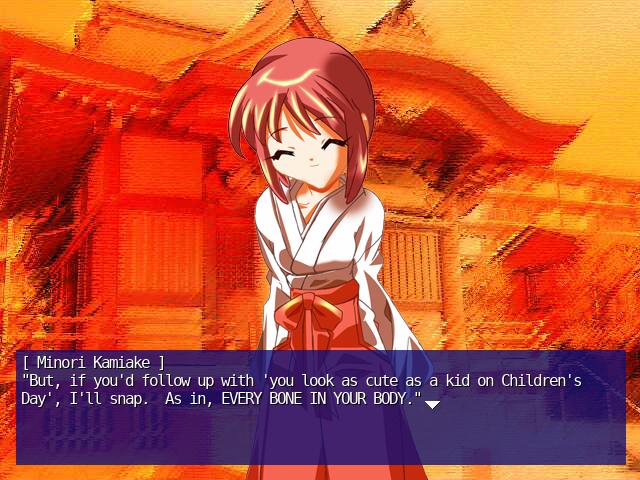
May 8, 2005
On May 8, Haruki arrived at the shrine with his own lunch – which resulted in a humorous-but-absurd debate with Minori, a tuna connosseur, about Haruki’s love of canned tuna (which Minori considered “blasphemy”). More significantly, Haruki shared his non-canned tuna with Minori, who brought out tea and then remarked that they should get dessert to go with the tea. Minori dragged Haruki to a nearby convenience store, picked out all the snacks, and then told Haruki “you’re welcome” after making him pay. They agreed to go for a second food run under the condition that Minori would pay, but Haruki ended up paying again – showing that Minori liked free stuff almost as much as she liked attention and Haruki was more or less incapable of saying no to her.
In between the tea trips, Minori, in a more serious moment, shared her nature sensibilities again. She regaled Haruki with facts about the clouds, which caused Haruki to ponder internally that he had never looked at the sky like Minori was having him do then. Then suddenly Minori said:
… God’s in His heaven; all’s right with the world.
Minori Kamiake
Haruki, in that moment, agreed. He then reflected on his exchange with Minori:
I’d seen the sky thousands of times in my life. But perhaps this was the first time I’d allowed myself to really OBSERVE it with all my might, without any other mission or distraction.
Haruki Mizoguchi
Minori was causing Haruki to appreciate the world around him. If we are being charitable to him, perhaps this was how she goaded him into paying for not one but two rounds of tea and snacks.
Part 1/4 Conclusion
The first part of May Sky gently introduces our two main characters and establishes their relationship.
We know that Haruki is just starting a new career, fresh out of college, as a corporate worker. He is living in a new place, has no friends and, for whatever reason, is deeply uneasy about the transition he is making from student to working adult. While Haruki is inconsistent in describing the particulars of his malaise, he does admit to have been feeling dead inside for the month before that fateful May 1 day when he followed the sound of Minori’s piano. Something about Minori’s playing touched Haruki, and Haruki was not disappointed when he actually met her. Her dreamy monologue about the virtues of May and spring and her imploring Haruki to admire the sky both touched him in similar ways to Minori’s music. Haruki says point-blank in his narration that he saw something incredible in the 16-year old shrine girl, and her idle musings changed the way he looked at the world around him.
Minori is more difficult to parse at this stage because we do not have access to her internal thoughts, but she is fortunately (for our purposes) reasonably transparent most of the time. She clearly did not think anything of Haruki on first sight – but was flattered when he praised her piano playing, especially when she put two and two together and realized that he had been coming to the shrine to listen every day. Minori appears to be a loner – although not as obviously as Haruki. She is an intelligent, quirky, but very definitely 16-year old girl. In one moment she speaks about nature with a sensibility beyond her years and in the next she throws a tantrum because Haruki is not paying enough attention to her. Minori quickly takes to Haruki, turning him into her confidant and free meal ticket while simultaneously maintaining that she neither supports nor opposes Haruki visiting her at the shrine.
This article is part of my collection of posts about May Sky, Insani's 2008 localization of a freeware Japanese visual novel called Gogatsu no Sora.
